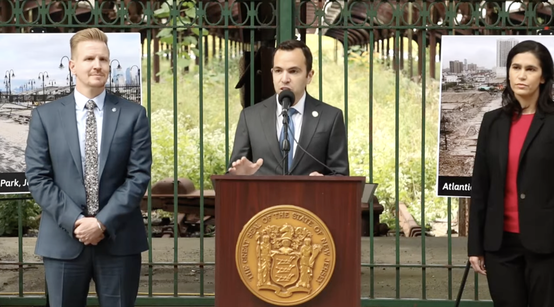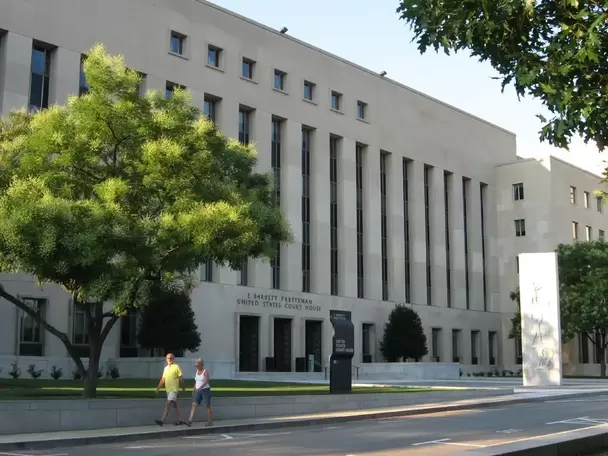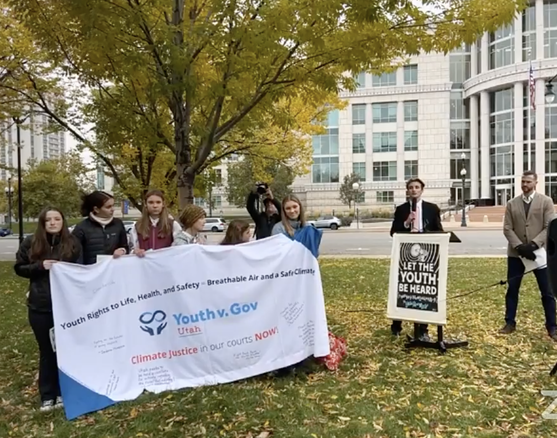|
Story originally published in DeSmog
In recent years, communities across the United States increasingly have turned to the courts to hold oil and gas companies accountable for alleged fraud — which has worsened the climate crisis — and now those lawsuits are inching towards trial. Despite dogged attempts from industry lawyers to force the litigation into federal courts, where they see an easier path to dismissal, they continue to strike out as judges from California to Connecticut rule that state courts are the appropriate venues for these climate accountability lawsuits. The latest addition to the fossil fuel industry’s long procedural losing streak came on November 12 when a federal district judge decided that the District of Columbia’s climate liability lawsuit belongs in the local court, where it was originally filed in June 2020. As with other climate liability lawsuits, lawyers for the oil and gas companies in the District of Columbia case devised a multitude of arguments claiming that only federal courts have the jurisdiction or authority to handle such lawsuits. But federal courts have not been buying these legal theories. “Defendants raise seven theories for the Court’s subject-matter jurisdiction. Each, they say, is an independent ground for removal. None is,” Judge Timothy J. Kelly of the U.S. District Court for the District of Columbia wrote in his recent opinion. He joins twelve other federal district judges and five appeals courts in dismissing all of the fossil fuel companies’ arguments for federal jurisdiction. Several of the appeals courts have even ruled twice to affirm that state courts are the right venue for these cases. The District of Columbia’s case is among two dozen lawsuits filed by cities, counties, and states against the fossil fuel industry over its role in attacking climate science and spreading disinformation in order to stave off climate action and protect profits. A handful of coastal California communities brought the first of these cases in 2017. Since then, the lawsuits have been bogged down in procedural wrangling. Local and state governments are making claims under local and state laws, invoking issues such as product liability – used to hold manufacturers responsible for selling a defective or harmful product- and consumer protection – designed to protect against misleading marketing and fraud — and have filed their complaints in state courts. Fossil fuel companies are pushing the cases to federal courts, fighting tooth and nail to avoid litigating in state courts, where they could face discovery and trial. “Chevron respectfully disagrees with the district court’s decision remanding this climate change action to the District of Columbia municipal court. This case belongs in federal court because climate change is a global phenomenon that requires a coordinated federal policy response, not a patchwork of lawsuits brought in municipal and state courts,” Theodore J. Boutrous, Jr. of Gibson, Dunn and Crutcher, and counsel for Chevron Corporation, said in an emailed statement. “The industry’s efforts to keep the cases from proceeding in state court for almost six years now indicates that, contrary to its public messaging otherwise, it thinks there’s a reason to be worried,” Karen Sokol, a law professor at Loyola University New Orleans College of Law, told DeSmog via email. One advocate for polluter accountability suggested that these procedural maneuvers represent the fossil fuel industry’s strategic bid for swift dismissal of the cases through federal courts. “Once again, the courts have seen through Big Oil’s attempts to mischaracterize these cases, and now the people of D.C. are one step closer to having their day in court,” Alyssa Johl, vice president of legal at the Center for Climate Integrity – which campaigns for holding climate polluters accountable — said in an emailed statement. The District of Columbia case, brought by Attorney General Karl Racine two years ago, names oil majors BP, Chevron, ExxonMobil, and Shell as defendants. It alleges they misled District consumers around the climate consequences of their products and continue to mislead through deceptive advertising and greenwashing. The lawsuit contends that this behavior violates the District’s Consumer Protection Procedures Act. “Independently and through coordinated campaigns and industry front groups, Defendants have deceived D.C. consumers about how Defendants’ fossil fuel products warm the planet and disrupt the climate in a quest to drive profits through increased sales of gas and other fossil fuel products. Defendants continue to mislead D.C. consumers to this day,” the complaint states. The District of Columbia and others bringing these climate liability lawsuits say their claims are based on the deceptive conduct of the fossil fuel companies, not on the emissions or production of fossil fuels. The companies, however, have tried to paint the cases as attacking production. “We do not believe the courtroom is the right venue to address climate change, but that smart policy from government, supported by action from all business sectors, including ours, and from civil society, is the appropriate way to reach solutions and drive progress,” said Natalie Gunnell, spokesperson for the Shell Group, which is named in the District of Columbia suit and several similar cases. However, Judge Kelly and other judges have pushed back against this framing that centers the cases in this way. “The ‘charged conduct’ here is Defendants’ false advertising – not fossil fuel production en masse,” Judge Kelly noted in his opinion. Similarly, in a ruling issued this April, an appellate court recognized that Baltimore was suing oil and gas companies not over the production and sale of fossil fuel products, but for mispresenting the climate harms of these products. As the court wrote, “it is the concealment and misrepresentation of the products’ known dangers – and the simultaneous promotion of their unrestrained use – that allegedly drove consumption, and thus greenhouse gas pollution, and thus climate change.” That Baltimore ruling followed a directive from the U.S. Supreme Court that the Fourth Circuit Court of Appeals and three other appeals courts review all of the arguments for federal jurisdiction from the fossil fuel companies. Each appellate court has since rejected the companies’ additional arguments. Fossil fuel giants are now returning to the Supreme Court with renewed and additional petitions, hoping the highest court will overrule the lower courts’ decisions about where the climate cases should be tried. Meanwhile, legal developments continue to frustrate the industry’s attempts to evade accountability. Cases filed by Hawaiian communities and by the state of Massachusetts are proceeding to the discovery phase in state courts, a pre-trial process of gathering evidence, during which internal industry documents could surface and shed new light on the extent of the industry’s deceptive behavior. Last month a federal district judge in California, who had previously tossed cases filed by Oakland and San Francisco, issued an order to send the cases, which were revived by a federal appeals court, back to state court. And New Jersey Attorney General Matthew J. Platkin followed in the footsteps of seven other Democratic state prosecutors in filing a consumer fraud case against ExxonMobil and other oil majors. A spokesperson for Exxon did not respond to a request for comment. BP America declined to comment. Judge Kelly’s order to send the District of Columbia’s case back to the lower court is temporarily paused as the oil companies prepare an appeal, as they have every other time a federal judge made a similar ruling. “Chevron plans to appeal this ruling to the D.C. Circuit Court of Appeals,” Boutrous, Jr. said. None of these appeals, however, have been successful. Loyola University’s Sokol sees these repeated rejections as further affirmation that local and state governments have the right to try these claims in state courts. Johl agreed. “These cases were filed in state court to hold polluters accountable for climate deception under state law,” she said. “And that’s where courts have unanimously agreed they should proceed.”
0 Comments
UPDATE: On November 9, 2022 Judge Faust issued a decision in favor of the state to dismiss the case. According to Our Children's Trust, he cited issues such as redressability (the ability for the dispute to be adequately remedied), the political question doctrine, and substantive due process as grounds for dismissal. Lawyers for the youth plaintiffs say they will appeal the ruling.
A youth-led lawsuit alleging the State of Utah is affirmatively harming its young citizens and shortening their lifespans through energy policy favoring fossil fuels came before a state judge Friday in a hearing that will determine whether the case will proceed towards trial. The Honorable Robert Faust heard oral arguments in Natalie R. v. State of Utah, a constitutional climate lawsuit brought by seven youth plaintiffs against their state government, and indicated he would rule on the procedural matter within days. The hearing on November 4 at the Third District Courthouse in Salt Lake City focused on the state’s motion to dismiss the case. Natalie R. v. State of Utah is one of a handful of currently pending climate cases in which young people are suing their state governments for promoting and permitting fossil fuels and thereby contributing to climate harms, which disproportionately burden youths and future generations. The cases claim states are violating their constitutions and seek declaratory relief – a court order stating that the challenged government conduct is unconstitutional. Besides Utah, such cases are currently active in Montana, Hawaii, and Virginia. The Utah case was filed on March 15, 2022 against the state over its systemic energy policy promoting fossil fuels despite being well aware of the climate dangers of continued use of coal, oil, and gas. According to the complaint, Utah is prioritizing fossil fuel development through official state policy (statutory law), which directly adds more greenhouse gas pollution and fouls the air with other pollutants. “Because of the development and combustion of fossil fuels, Utah has the worst average air quality of any state in the nation and is already experiencing profoundly dangerous climate changes,” the complaint states. Plaintiffs are seven young people, ages 9 to 18, who all have been directly and adversely impacted by fossil fuel air pollution and climate change consequences like wildfires and droughts. Some have asthma or asthma-like symptoms and all suffer mental distress tied to the worsening air quality and climate crisis, which impairs their access to the outdoors including their enjoyment of outdoor recreational activities. The poor air quality not only threatens their health, but also endangers their lives and gradually shaves years off their lifespans. “Because of living in that dangerous air quality, youth in Utah have years taken off of their lifespans, that’s what the data shows,” Andrew Welle, Senior Staff Attorney at the nonprofit Our Children’s Trust and counsel for the youth plaintiffs, told Climate in the Courts. “The government knows this, but they are doubling down on fossil fuels.” Plaintiffs say the state’s conduct violates their constitutional rights to life and liberty, endangering their health and safety. Welle said that defendants don’t dispute that Utah’s youth are having their lives shortened and that state conduct contributes to that. But, as he explained, the state argues that courts cannot resolve the matter because energy policy is the domain of the political branches. “Essentially what the state is arguing is the court can’t decide these constitutional claims,” Welle said. The state mentioned in its closing argument that the legislature would put together a working group to look into the issue. “Deferring to the legislature to decide a constitutional question with working groups would turn Utah’s Constitution and constitutional law on its head,” Welle said in a statement. “The courthouse doors would be closed to any constitutional claim that the State decided had economic or job implications. That is not the way the law works. The State can’t strip the judiciary of its vital role in interpreting the Utah Constitution and deciding life-threatening constitutional questions.” Welle told Climate in the Courts that the state is “mischaracterizing the plaintiffs’ claims in a number of ways” and said he feels optimistic that Judge Faust will rule in the youths’ favor. “Judge Faust was engaged, he was taking notes, and I think he was attentive to the arguments we were making,” he said. “It was exciting to congregate today and watch as our attorney argued for our right to move on to trial,” Lola Moldonado, an 18-year-old plaintiff from Salt Lake City, said. “I hope to see Judge Faust rule in favor of our case so we can present evidence on how our lives have been harmed by the state’s support of the fossil fuel industry.”  New Jersey Attorney General Matthew J. Platkin (center) announced on Oct. 18, 2022 that the state is taking legal action against major oil and gas companies to hold them accountable for climate damages to the state. Also pictured: Department of Environmental Protection Commissioner Shawn LaTourette (left) and Acting Director of the Division of Consumer Affairs Cari Fais (right). ExxonMobil and several other major oil companies facing a barrage of climate liability lawsuits from U.S. cities, counties and states were served with yet another legal complaint last month, from the state where Exxon originated and remains incorporated.
On Tuesday, October 18 New Jersey became the seventh state thus far to bring a lawsuit against Big Oil for allegedly misleading the public on climate change, disseminating disinformation for decades that effectively staved off policy responses and aggravated the costly impacts of the climate crisis currently unfolding. The case was filed in New Jersey Superior Court in Mercer County, a state court, and names ExxonMobil, BP, ConocoPhillips, Chevron, Shell, and the trade association American Petroleum Institute (API) as defendants. “Based on their own research, these companies understood decades ago that their products were causing climate change and would have devastating environmental impacts down the road,” said New Jersey Attorney General Matthew J. Platkin. “They went to great lengths to hide the truth and mislead the people of New Jersey, and the world. In short, these companies put their profits ahead of our safety.” Platkin announced the lawsuit at a press conference from Liberty State Park in Jersey City, a location that was inundated with five feet of water during Superstorm Sandy in late October 2012, nearly 10 years ago to the day. The storm devastated the state, claiming 38 lives and costing $30 billion in property damage. These kinds of catastrophic extreme weather events were foreseen consequences of unabated fossil fuel consumption, yet instead of responsibly acting on this knowledge and disclosing it to the public, the fossil fuel industry downplayed the risks and tried to discredit the science, New Jersey’s complaint contends. “Defendants not only failed to warn the public but they lied to us for decades to cover it up,” Attorney General Platkin said during the October 18 press conference. “If you lie to the public to protect your profits we will hold you accountable.” The lawsuit includes claims of failure to warn and negligence as well as trespass, public and private nuisance, impairment of the public trust, and violations of New Jersey’s Consumer Fraud Act. In addition to civil penalties, monetary damages and disgorgement of profits unlawfully acquired, the state is seeking injunctive relief to stop the defendants’ deceptive behavior. Their misleading conduct is ongoing, the state argues, with pervasive greenwashing campaigns portraying their products as “clean” and “lower carbon” and advertisements that misrepresent their commitment to renewable energy. Cases with similar claims of consumer fraud against oil majors like Exxon are currently pending in a handful of states including Connecticut, Delaware, Massachusetts, Minnesota, Rhode Island, and Vermont as well as the District of Columbia. More than a dozen cities and counties, from Honolulu to Hoboken, have also filed lawsuits to hold fossil fuel companies accountable for their role in driving the climate crisis. Hoboken, which was submerged during Sandy, brought its case in September 2020, and now the state of New Jersey is following suit. The state will have a long road ahead of it. The other climate liability cases have been mired in procedural battles, some for years, and no case has yet made it to trial aside from a New York case alleging Exxon misled investors, which a judge subsequently dismissed. But New Jersey is not afraid to take on this fight. In the words of Attorney General Platkin: “To the companies that have been lying to us for decades, I say we’ll see them in court.” |
Archives
July 2024
Categories |


 RSS Feed
RSS Feed